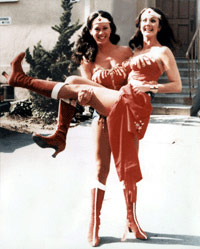By Sharon Haywood, Co-Editor

What do a cowgirl, Wonder Woman’s stunt double, and a beauty queen crowned inside a Colombian prison have in common? Filmmaker Amanda Micheli. Since 1996, she has cast women such as these as the unlikely protagonists in her acclaimed documentaries, such as Just for the Ride, Double Dare, and La Corona. Micheli, an award-winning director, producer, and cinematographer isn’t interested in fitting into a particular niche or appealing to a specific audience, but rather the Harvard graduate gravitates to creating films that fall “outside of the box.” According to Micheli, women filmmakers are “pigeon holed.” She elaborates by saying, “We have weepies, movies that make you cry, the touch-feely women’s films. I have nothing against those films but they aren’t the kind of films I make.” No, instead Micheli creates the type of films that we celebrate at Adios Barbie, films that present women in roles you rarely see in mainstream media: Women “who identify themselves through a certain kind of physical presence and courage that goes beyond sexual identity.”
Her latest project is no exception. Micheli branches away from documentaries to explore the world of fiction. She is working on her first screenplay (tentatively titled Tomboy), a coming-of-age story featuring 16-year-old Ruby and her experience as a young rugby player. Micheli is vested in giving the female athlete more screen time, which makes sense considering that the filmmaker also played for the U.S. women’s rugby team. Her screenplay, although not autobiographical, taps into her experiences as a player for the national team and as a coach for Berkley High’s all-girls rugby team. Inspiration for her screenplay in part comes from watching the teen girls grow from playing rugby: “Some never played sports before, had low self-esteem, and didn’t feel a sense of power in the world,” she explains. “Playing rugby opened their eyes to the power in their bodies. You’ve got girls of all shapes and sizes who never thought they could [feel] that joy of taking someone down. It is not a typically female experience. It’s not about violence. There’s a very positive outlet for aggression in contact sports that men have enjoyed for centuries.”
She describes Ruby as “a real life female action figure” who Micheli has cast as a shorter girl. “In the rugby world there’s a specific position that’s meant for smaller people,” she explains. “It’s incredibly rare to have that kind of diversity. In a lot of sports you tend more toward uniform body shapes. In rugby … gaining weight, body fat is okay.” Tomboy not only looks at body-image issues but it will also potentially tackle themes of identity, such as homophobia, and racism as it relates to the Samoan community in San Francisco. Although her first draft is complete, the filmmaker admits, “I’m struggling as a writer to create her true image. I want Ruby to figure out who she is.” One thing Micheli knows for sure is that Ruby “does not fit a cookie-cutter image.” The same can be said of Micheli’s eclectic documentaries.

Her first production, Just for the Ride (1996) received a Student Academy Award and features two fearless female rodeo champions, 76-year-old Fern Sawyer and 51-year-old Jan Youren. Micheli’s exploration of women in professional rodeo questions traditional perceptions of women and has been touted as a film that rails against sexism and ageism. Her second film, Double Dare (2004) stars two stuntwomen: Jeannie Epper and Zoë Bell. Epper donned the real muscles behind the 1970s Wonder Woman, and Bell shouldered the heavy lifting for Lucy Lawless as Xena the Warrior Princess and Uma Thurman in Tarantino’s Kill Bill. The documentary has earned praise as a film that smashes gender stereotypes but what Micheli loves about this film is that it reveals the “real people behind the iconic images.” Her next documentary, the Academy Award nominated La Corona (2008) co-directed with Isabel Vega, chronicles the experience of four inmates in a beauty pageant set inside Bogotá Women’s Prison. The character-driven film challenged her own beliefs about beauty pageants: “I thought it would be easier to criticize or deconstruct these women’s involvement in the beauty pageant but when I got in the prison I recognized that were so passionate about it … and it was hard to take an ideological stance.”
Fans of Micheli’s work have tried to categorize her both personally and professionally, but she resists classification. Both Just for the Ride and Double Dare have received an overwhelming positive response from the LGBT community, which has led folks to label her as a gay filmmaker. For the record, Micheli who is in a long-term relationship with a man states:
“I certainly don’t identify as a straight woman, but I don’t identify one way or another. I take the more intellectual point of view that sexual identity is sort of limiting … I think that gender identity is much broader than sexual identity.”
In terms of the women in her films she says: “I haven’t set out to make films about women of any certain sexual identity. Just for the Ride is about two female cowgirls who identify as straight but they’re kind of butch. That’s one thing I love about these women is that they defy categorization.” And that’s exactly what we love about Micheli and her work.
Read more about Micheli and her various other projects at her website www.runawayfilms.com
Check out other profiles of Body Bandits at Adios Barbie:
Margaret Cho on the Power of Reclaiming Beauty
Jennifer Jonassen: A Sizeless Star
2 thoughts on “Filmmaker Amanda Micheli Defies Categorization”